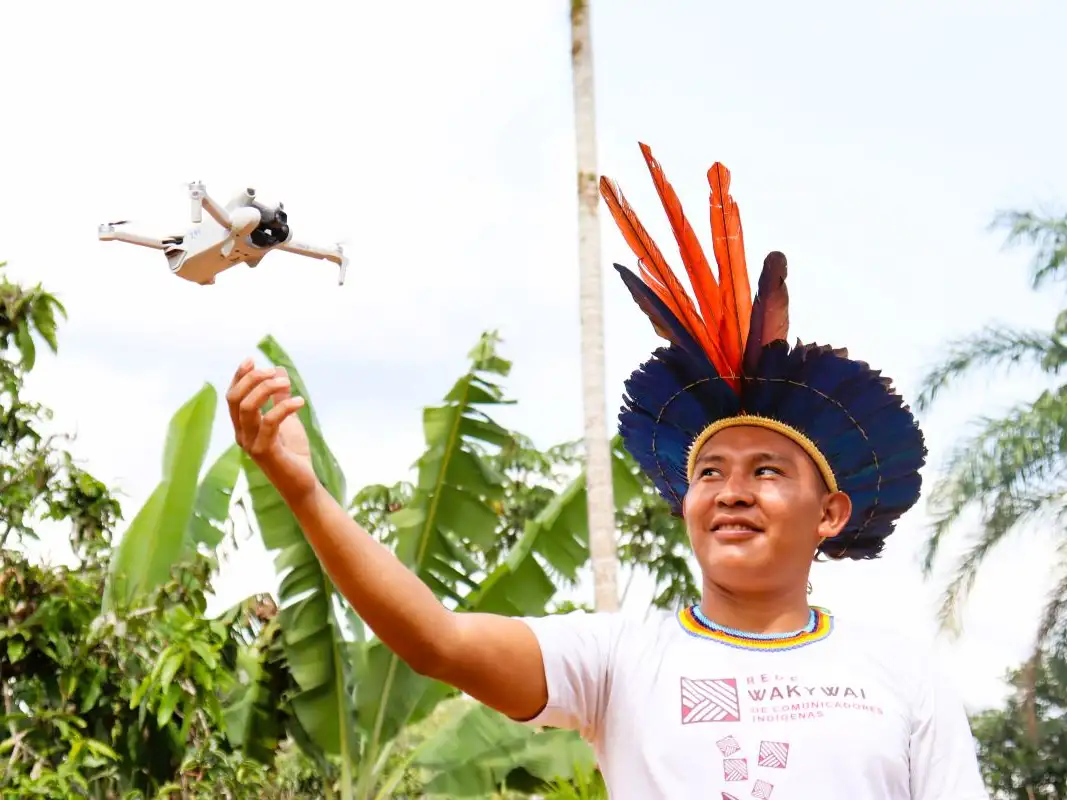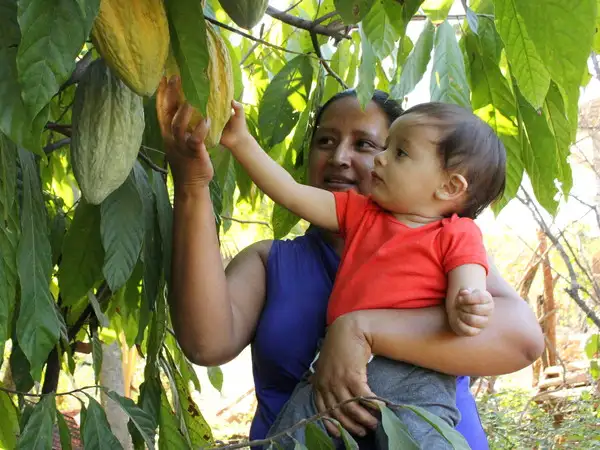

Young indigenous leaders are learning how to use drones to monitor and report to authorities on deforestation in the Brazilian Amazon. Credit: Evilene Paixao, Partner Hutukara Yanomami Association (HAY)
With over 200 million people, Brazil is the largest and most populous country in Latin America. It is the ninth most unequal country in the world, with around 60 million people living in poverty and 20 million in extreme poverty. Wealth and land are heavily concentrated: roughly 1 per cent of landowners control over 45 per cent of all rural land.
Brazil is home to around 1.7 million indigenous people across 305 ethnic groups and over 1.3 million Afro-Brazilians living in quilombola communities. Both face systemic threats to their land and way of life due to Brazil’s extractive economic model – dominated by economic interests such as mining, logging and industrial agriculture. Brazil is the second most dangerous country in South America for defending human rights and the environment.
In urban areas, 26 million people are homeless or living in unsafe, overcrowded homes lacking basic sanitation and access to services. Many people live in precarious areas prone to floods and landslides –risks that are worsening due to the climate crisis. In cities like São Paulo, high rents forces families to choose between housing and food.
The Brazilian Amazon rainforest has intrinsic value in its own right; it is a living eco-system that is vital for all humanity. The rainforest plays a crucial role in the fight against climate change, as its vast forests absorb significant amounts of carbon dioxide, helping to stabilise the global climate and regional rainfall patterns. Indigenous communities play a crucial role in protecting these ecosystems through their traditional knowledge, sustainable land management and stewardship of the forest.
CAFOD has worked with local organisations in Brazil for over 50 years to challenge inequality, defend human rights, support community-led change, achieve social justice and protect the environment. Together, we are building a fairer, more just world.
Our impact in 2024
In 2024 we reached 37,458 people in Brazil through our programmes.
Partner Hutukara Yanomami Association (HAY) led advocacy efforts that reduced illegal gold mining by 91 per cent and malnutrition-related deaths by 68 per cent in Amazonian Yanomami territory (in comparison to 2023), winning the Sustainability Award at Caritas Europa Innovation Festival 2024. These efforts have led to the protection of 30,000 Yanomami, Ye’kuana and Sanoma peoples.
1,655 people received emergency cash and relocation support following the most severe droughts in the Brazilian Amazon history, through our work with Caritas Brasileira.
287 formerly homeless families, mostly led by single women, moved into the renovated Prestes Maia building in São Paulo. With our partner Semeando, this 12-year struggle turned Latin America’s largest occupied building into a legally owned building providing safe and dignified housing to hundreds of people, mainly women and children.
Why CAFOD works in Brazil
About 80 per cent of Brazilians live in urban areas, yet millions remain in poverty. Rural families migrate to cities in search of better opportunities but end up in inadequate housing, deprived of shelter, access to work, education, food, health and safety.
Women, Afro-Brazilian people and children are most affected, with women-headed households making up 60 per cent, and black or mixed-race households 53 per cent, of those in inadequate housing.
Around a third of Brazilians work in informal jobs without job security and many face limited access to quality education, healthcare and adequate housing. Brazil’s extreme inequality is fuelled by high levels of racial and gender discrimination which disproportionately affect indigenous peoples, Afro-Brazilians, women and other disadvantaged groups like the landless and homeless. With the fifth highest femicide rate in the world, women in Brazil face extremely high levels of violence.
Brazil is one of the most biodiverse countries in the world and is rich in natural resources. Around 60 per cent of the Amazon rainforest is found in Brazil. The Amazon is the world’s largest rainforest but the forest and indigenous and Afro-Brazilian communities living there are under severe threat due to large-scale cattle and farming, timber, mining projects and illegal gold mining, which negatively impact the environment and threaten local communities.
Brazil has experienced a dramatic rise in climate related disasters in recent years in urban and rural areas, with extreme floods and the highest number of forest fires and droughts ever recorded in the Amazon. Renowned scientists have stated that the Amazon rainforest is reaching the tipping point with severe consequences for our planet.
How we’re responding
Together, we can build a better world. Donations from you can make sure that no one in Brazil has their life limited by injustice or poverty – that everyone has the support they need to flourish.
We work alongside grassroots and community-led organisations in Brazil to create long-term, transformative change.
Current projects
We support Indigenous and rural communities defending their territories from illegal mining, logging and environmental destruction, which are exacerbating the impacts of the climate crisis.
In Yanomami land, our partners work to stop deforestation, improve healthcare, and protect women and girls from sexual abuse and violence - all caused by illegal gold mining.
CAFOD is addressing UK demand for illegal Brazilian gold by influencing UK policy and regulations on gold trading standards, working with the London Bullion Market Association to improve gold trading standards and end harm. This is key to achieve global change, as the UK is the third-largest importer of Brazilian gold, of which up to 50 per cent is illegal.
We support excluded communities - particularly women, Afro-Brazilians, older people and children - to secure decent housing, infrastructure, transport and work in São Paulo.
Through women’s leadership training, legal advocacy and community mobilisation, our partners help people, especially women, to reclaim their rights, access public services and shape just urban development.
We assist rural communities to understand and secure their land rights and adopt climate-resilient farming methods.
Farmers are trained in eco-friendly techniques to protect soils and water, restore biodiversity, and increase their income through better market access.
We partner with organisations like Caritas Brasileira to respond to floods, droughts, fires and other climate emergencies.
Support includes food, clean water, cash transfers and rebuilding stronger, safer communities. We also respond to 'invisible emergencies' like land conflict and systemic violence.
Associação Semeand Educação, Habitação, Saúde e Vida
Comissão Pastoral da Terra - Paraíba
Comissão Pastoral da Terra -Marabá /Xinguara/Tucuruí
Conselho Indigenista Missionário - Norte I
Conselho Indígena de Roraima
Cáritas Brasileira
Cáritas Brasileira Regional do Piauí
Grito dos Excluídos Continental
Hutukara Associação Yanomami
Instituto Brasileiro de Análises Sociais e Econômicas
Instituto Cultivar
Instituto SocioAmbiental
Movimento de Defesa das Favelas
Rede Eclesial PanAmazónica - Brasil

What we do
CAFOD is the official aid agency for the Catholic Church in England and Wales.
With your help, we reach out to people living in hard-to-reach places, in war zones and those who are discriminated against.

